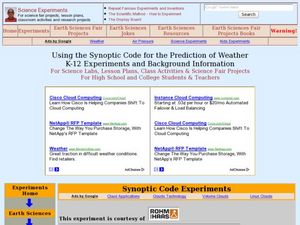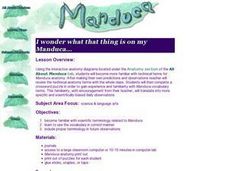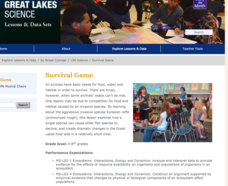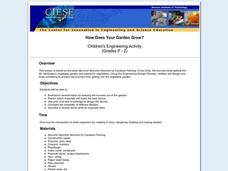Curated OER
Using the Synoptic Code for the Prediction of Water
Students construct a thermoscreen for the experiment. In this earth science lesson, students make observations and interpret them using synoptic codes. They predict the weather based on gathered information.
Curated OER
Environmental Sun Prints
Students are introduced to the term environment as it relates to animals, plants or non-living objects. In this environmental lesson, students make sun prints of various small objects by placing them on photosensitive paper and exposing...
Center for Learning in Action
Investigating Physical and Chemical Changes
Super scientists visit ten stations to predict, observe, and draw conclusions about the physical and chemical changes that occur when different states of matter—liquid, solid, and gas—are placed under a variety of conditions. To...
Cornell University
Scaling Down: Effects of Size on Behavior
Two activities explore the concept of size, especially small sizes down to the nano. Scholars practice determining volume, mass, and density and calculate exponential increases and decreases. They then predict and test the effect of size...
Curated OER
Deep Impact's Comet on a Stick!
Young scholars create a model of a comet. In this space science lesson, students compare their model to the characteristics of a real comet. They evaluate and make necessary modifications to their original design.
Curated OER
Predicting the Future
Students examine how scientists predict the effects of global climate change. In this environmental science lesson plan, students participate in a discussion about using computer generated data to create climate predictions. Students...
Curated OER
Effect of Technology on the Environment
There's no doubt that one of the most consistent dangers to our environment is the risks associated with the extraction and shipment of oil. This lesson focuses on oil spills - how they happen, the effects they have on the environment,...
Cornell University
Predicting Chemical Reactions
Prove the Law of Conservation of Mass through a lab investigation. A well-designed lesson asks groups to combine materials and monitor indicators for chemical reactions. Measuring the mass of the reactants and products allows individuals...
Beyond Benign
The Big Melt: Arctic Ice Caps
Are the Arctic ice caps really melting out of existence? Junior climatologists examine the statistics of ice decline through four math-based lessons. Each activity incorporates data, climate information, and environmental impact into an...
Curated OER
I Wonder What That Thing Is On My Manduca
Students use the internet to gather more information on the anatomy of the Manduca. They make predictions of what the insect will look like when it hatches and complete a crossword puzzle to practice their vocabulary. They continue to...
Curated OER
Chilling Predictions
Young scholars research and prepare an almanac on the Arctic. They examine the laws that attempt to provide jurisdiction over this area and consider how these laws be affected if geography of the Arctic continues to change due to global...
Michigan Sea Grant
Survival Game
Musical chairs may be a classic game, but Ruffe Musical Chairs is a unique lesson on invasive species! Using the time-honored game, pupils role play the behaviors of the invasive fish called Eurasian ruffe. Learning about this aggressive...
Curated OER
Whole Lotta Shakin Going On
High schoolers study how tectonic plates can produce earthquakes. In this earthquake instructional activity students use a model earthquake machine to explore hypotheses about earthquakes.
Smithsonian Institution
Weather Widget
What's so difficult about predicting the weather? Scholars work collaboratively to build a device that models how meteorologists use computers to forecast weather. Team members collect and interpret data while working together to...
NASA
Moon Phases and Eclipses
Starry-eyed astronomers draw different views of the Moon in order to introduce its phases. Then they experiment with a ball and a lamp to recreate the phases. A demonstration ensures every pupil understands the process, and the...
Steven's Institute of Technology
How Does Your Garden Grow?
What to do, bunnies are getting into the garden and eating all the carrots! After reading the story Muncha! Muncha! Muncha! the class works together to design a device that will keep those bunnies out of the garden. They get together in...
Curated OER
Foliage Tracker
Young scholars discuss the change of leaf colors and the role that climate and elevation play in those changes. They then track leaf changes, input data, and graph foliage changes with a free online tool.
University of Georgia
Monohybrid Crosses and The Punnett Square Lesson Plan
Looking for a quick, hands-on activity to teach young scientists about Punnett squares through monohybrid crosses? then check out this one.
Curated OER
Scientific Method Experiment: Factors Affecting How Ice Melts
Students demonstrate the scientific method by conducting an ice cube melting experiment. They make predictions and observations, and conclude what factors make ice melt more slowly or quickly than normal.
K20 LEARN
Water We Going To Do? Floodplains And Watershed Management
How has human activity affected Earth's watersheds? An action-packed lesson plan, part of the K20 Center, examines water's ability to go with the flow regardless of what is in its path. Scholars build model watersheds, examine time-lapse...
Baylor College
Body Strength
Your young learners will discover how muscular strength and endurance can increase with this truly hands-on activity! Beginning by writing an acrostic for the word strength, class members then engage in tracking their ability to squeeze...
Science Matters
Thermal Energy Flow in Materials
The sun sends the earth 35,000 times the amount of energy required by all of us on the entire planet, every day. The fourth lesson in the 10-part series looks at how light energy from the sun transfers into thermal energy. Scholars build...
Curated OER
Trends Forecasting
Students practice trends forecasting to predict the weather. In this forecasting lesson plan, students learn how meteorologists predict the weather by looking at weather trends. They then predict their own forecast, analyze the results,...
Curated OER
Measuring Snowfall
Students predict the amount of snowfall for the week and measure snowfall. In this measuring snowfall lesson plan, student use a precipitation gauge to measure the week's snowfall; and analyze the data to determine whether or not...

























